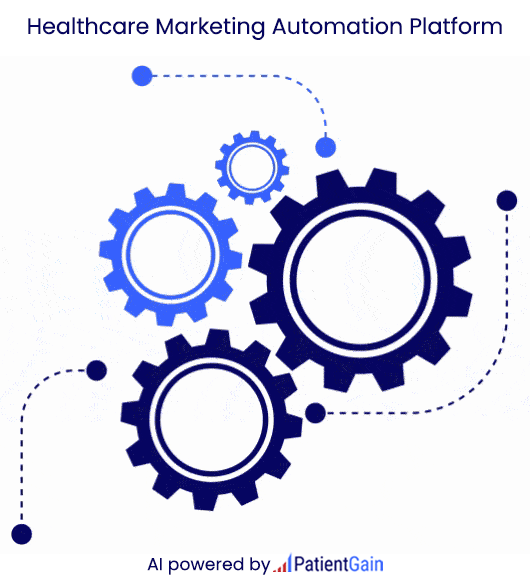Generative Engine Optimization (GEO) and Answer Engine Optimization (AEO) for Medical Websites
AI agents, such as those used by Gemini, ChatGPT, and Microsoft Copilot, have changed digital marketing. They have shifted it from traditional search engine rankings to Answer Engine Optimization (AEO). For medical and dental practices, visibility relies less on keywords. It depends more on how effectively AI can “describe” and “recommend” services. These recommendations are based on the content and technical attributes of a website. This applies to dental SEO and all healthcare practices.
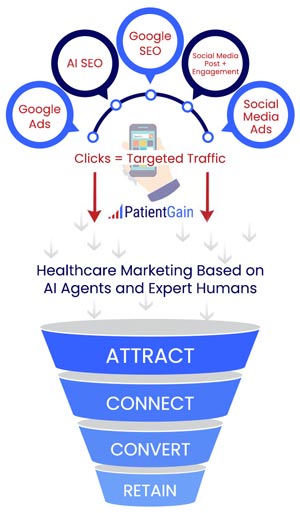
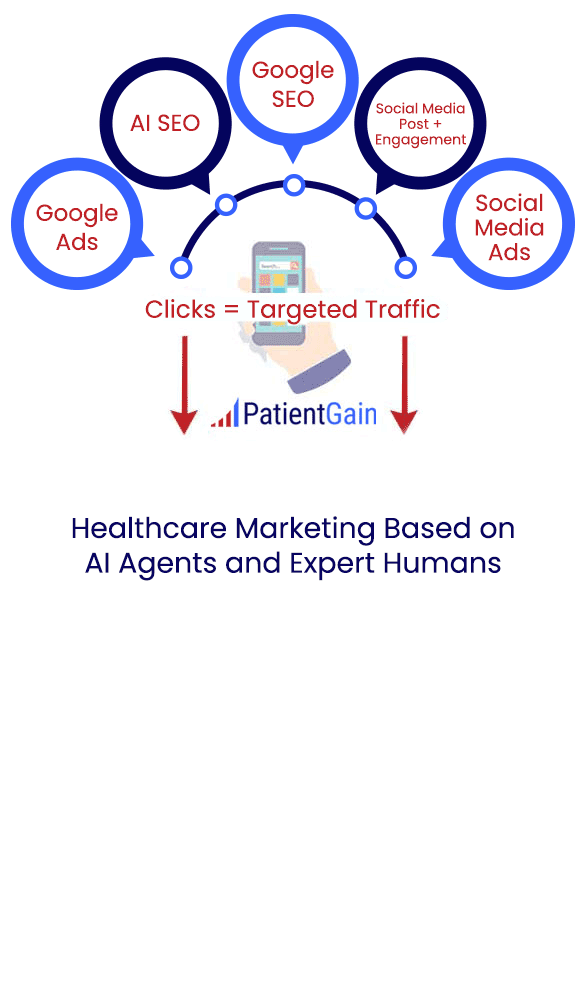
Google’s AI-driven algorithms (DeepMind) are transforming how medical websites appear in search results, prioritizing relevance, quality, and user experience. Here’s an in-depth look at how AI influences SEO for medical websites and the strategies to optimize for better visibility. Also note that Google’s algorithms reward high quality useful content on your website. For example, if you created a website page that provides useful information about a certain treatment, like Botox for migraines, and content was generated by AI and then optimized by human being (like a professional medical content writer), you will still see good SEO results. So the quality of the website, and quality of the content is still the most important aspect of AI based Medical SEO or AI based dental SEO.
AI-Powered Optimization: PatientGain leverages Artificial Intelligence in its SEO strategy. This includes AI-driven website design for high conversion, AI strategies for updating meta descriptions, keywords, and page structures, and AI-assisted content creation, which is then verified by expert humans. PatientGain has created its own reverse search engine algorithm and an AI based agent. This means PatientGain uses algorithms to analyze how patients are searching for medical services and then optimize their clients’ online presence to match those search patterns, effectively “reversing” the typical search engine optimization process.
- AI-Driven Website Optimization
- Utilizes AI to design websites that are optimized for high conversion rates.
- Employs AI strategies to update meta descriptions, keywords, and page structures, ensuring they align with current search trends.
- Incorporates AI-assisted content creation, which is then reviewed and verified by medical content expert humans. Finally, customer ( practice managers ) are sent an alert by Email.
- Reverse Search Engine Algorithm
- PatientGain has developed its own reverse search engine algorithm and AI-based agent.
- This approach analyzes how patients are searching for medical services and optimizes the practice’s online presence to match those search patterns, effectively “reversing” the typical SEO process.
- Enhanced Understanding of User Intent
- Google’s AI leverages advanced semantic search and personalized algorithms to deliver highly relevant results.
- PatientGain’s SEO strategies focus on understanding the context and intent behind medical and dental queries, ensuring that the practice’s website provides precise and helpful information.
- Focus on Content Quality and Relevance
- Google prioritizes websites that demonstrate credibility, expertise, and user-friendliness.
- PatientGain emphasizes the creation of high-quality content that is informative, focused on your medical or dental services, and engaging, tailored to patient needs.
- The service also focuses on enhancing the practice’s E-E-A-T (Experience, Expertise, Authoritativeness, Trustworthiness) by showcasing credentials, citing reliable sources, and adhering to ethical guidelines.
- Technical SEO Best Practices
- Ensures fast-loading websites to provide better user experiences, which are favored by Google’s AI.
- Optimizes websites for mobile-first indexing, emphasizing the need for seamless mobile experiences.
- Implements secure website protocols (HTTPS) to build trust with users and improve search rankings.
- Utilizes structured data to help search engines understand the content and context of the website, enhancing visibility in search results.
Benefits of AI-Powered Medical SEO & Dental SEO
- Improved Search Engine Rankings: By aligning with Google’s AI-driven algorithms, practices can achieve higher rankings in search results, increasing online visibility.
- Increased Organic Traffic: Optimizing for AI ensures that the practice’s website appears in relevant search queries, attracting more potential patients.
- Enhanced Patient Engagement: Providing accurate, relevant, and easily accessible information improves patient trust and engagement.
- Compliance and Credibility: Focusing on E-E-A-T principles ensures that the practice’s website meets healthcare industry standards, building credibility with both patients and search engines.
Example 1 : AI powered Google AEO results – Patient is looking for a doctor who provides services for seniors
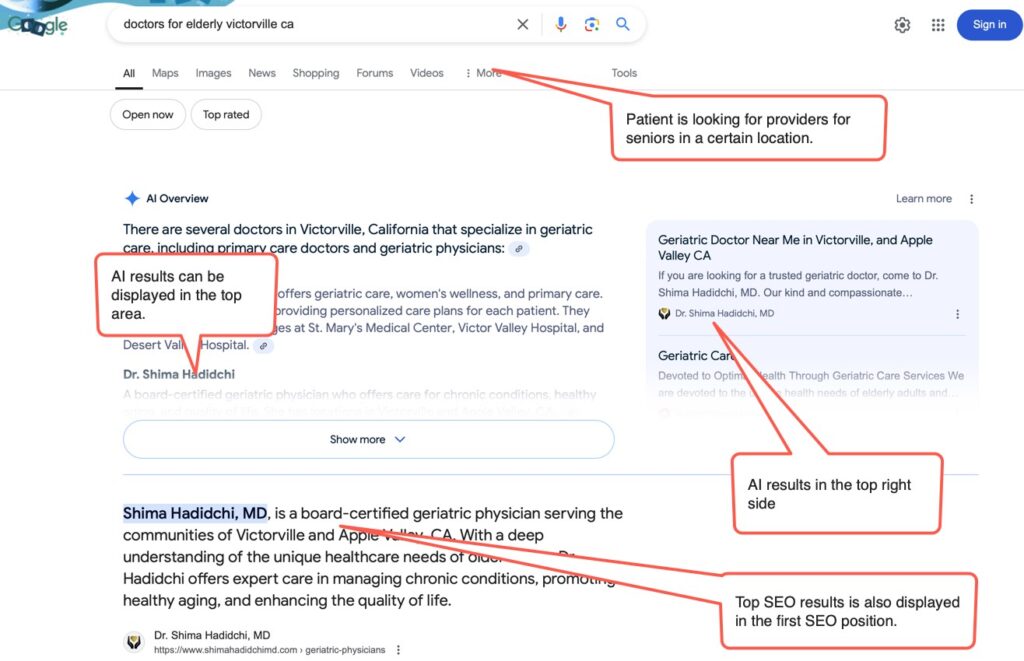
Example 2 : AI powered Google SEO results – Patient is looking for cost of dental implants
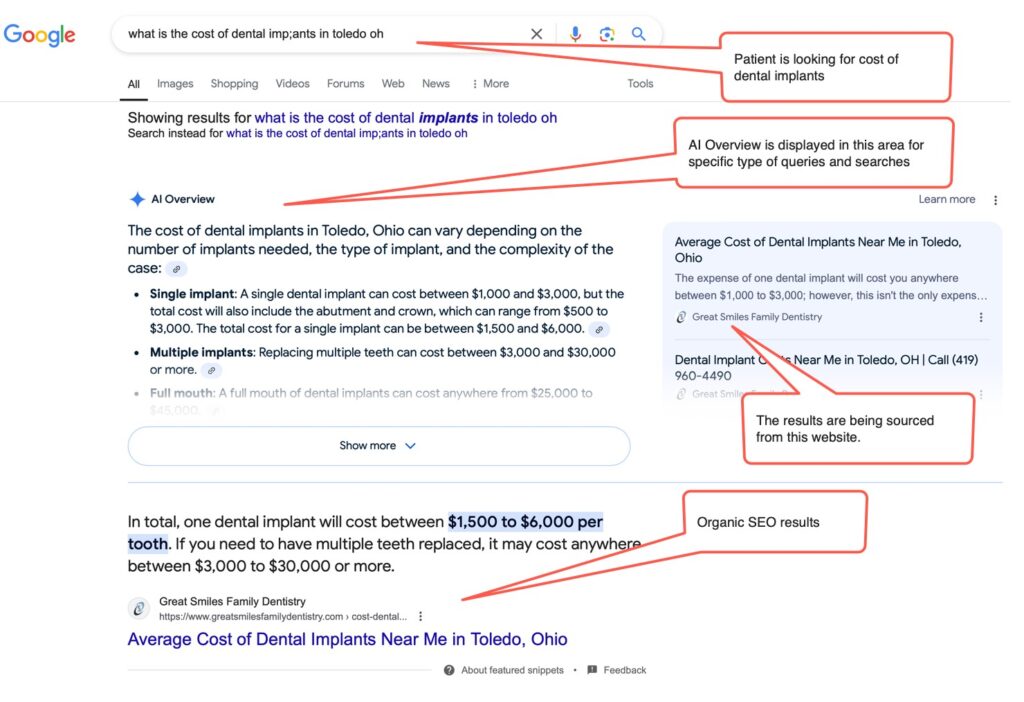
Example 3: AI powered Google SEO results – Patient is looking for cost of Botox
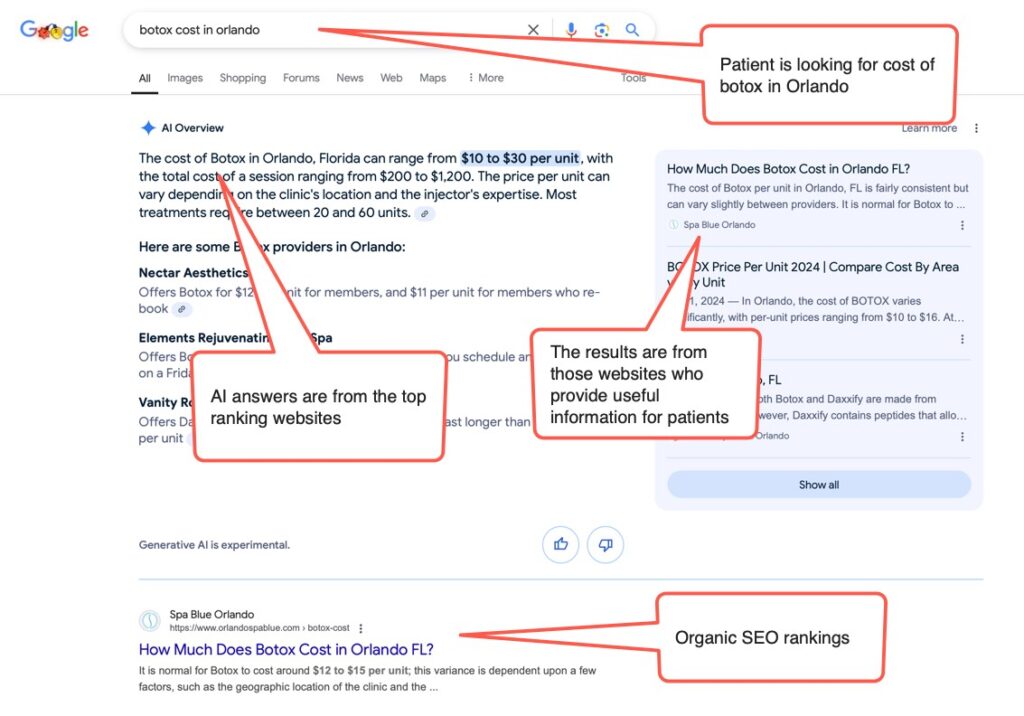
Enhanced Understanding of User Intent
Google’s DeepMind AI leverages advanced semantic search and personalized algorithms to deliver highly relevant results:
- Semantic Search:
- AI analyzes the context and intent behind medical and dental queries to provide precise answers. For example, a search for “symptoms of diabetes” might show educational articles, infographics, or FAQs addressing that topic.
- Personalized Search:
- Search results are tailored to individual users based on their browsing history, location, and past search behavior. A patient searching for “dentist near me” will see results specific to their location.
- Featured Snippets and Knowledge Panels:
- Medical and dental websites optimized for AI have higher chances of appearing in featured snippets or knowledge panels, offering quick answers to queries like “What is a root canal?” without needing to click through.
Focus on Content Quality and Relevance
Google prioritizes websites that demonstrate credibility, expertise, and user-friendliness:
- High-Quality Content:
- AI rewards content that is informative, accurate, and engaging. Content pages, videos, and FAQs tailored to patient needs rank higher. Regardless who wrote the content, however you should never “copy” or “plagiarize” content.
- E-A-T (Experience, Expertise, Authoritativeness, Trustworthiness):
- For medical websites, showcasing credentials, citing reliable sources, and adhering to ethical guidelines are vital to earning higher rankings.
- Mobile Fast Loading Optimization:
- AI prioritizes mobile-friendly designs as the majority of searches are conducted on smartphones. A responsive website is essential for ranking well.
Technical SEO Best Practices
Technical optimization plays a critical role in ensuring AI algorithms can effectively analyze and rank a website:
- Page Speed:
- Fast-loading websites provide better user experiences and are favored by Google’s AI.
- Mobile-First Indexing:
- Websites optimized for mobile devices are indexed first, emphasizing the need for seamless mobile experiences.
- Secure Website:
- Using HTTPS to encrypt traffic not only builds trust with users but is also a ranking factor for Google.
- Structured Data:
- Implementing schema markup helps AI better understand and display content in rich results, such as star ratings, contact information, or service details.
Emerging Trends in AI-Driven SEO
- AI-Powered Chatbots:
- Chatbots provide instant answers to patient queries, improving user experience and reducing staff workload. They also contribute to user engagement metrics.
- Voice Search Optimization:
- Optimizing for natural language and long-tail keywords ensures medical websites perform well in voice search queries like “Where is the nearest urgent care?”
- Personalized Content:
- AI tools analyze user behavior to suggest personalized resources, such as recommending blogs or FAQs based on previous interactions.
How Google’s AI Impacts Medical Website Rankings
- Enhanced Understanding of User Queries:
- AI ensures search results align closely with a patient’s intent, prioritizing websites that deliver valuable and accurate information.
- E-A-T Emphasis for YMYL Content:
- Medical content, classified as “Your Money or Your Life” (YMYL), is subjected to stricter scrutiny. Websites that demonstrate authority and trustworthiness rank higher.
- Promoting Accessibility and Usability:
- Google values accessible websites with intuitive navigation and mobile-friendly designs, leading to better rankings and improved patient satisfaction.
AI SEO for healthcare websites uses artificial intelligence to optimize a medical practice’s online visibility by analyzing search data to understand patient intent and creating content that directly addresses patient needs. Key strategies include focusing on user intent over simple keywords, leveraging conversational content, implementing structured data, and optimizing for local and reputation-based searches like Google Business Profile and online reviews. This helps websites rank higher in search results, build patient trust, and ultimately attract more patients.
How AI is changing SEO for healthcare
- Shift from keywords to intent: AI focuses on understanding the underlying intent behind a patient’s search query, not just the keywords themselves.
- Personalized content: AI helps create content that speaks directly to specific patient needs and concerns, improving relevance and engagement.
- Faster optimization: AI tools can analyze vast amounts of search data to identify optimal strategies much faster than manual methods.
- New visibility challenges: AI-generated overviews in search results can reduce clicks to traditional websites, making it crucial to be visible within these AI summaries.
Key strategies for AI-powered healthcare SEO
- Focus on E-E-A-T: Emphasize Experience, Expertise, Authoritativeness, and Trustworthiness to be recognized as a credible source, especially for AI overviews.
- Local SEO and reputation:
- Optimize your Google Business Profile and manage online reviews, as many patients search for local providers (“near me”).
- Leverage patient reviews as a source of fresh, trustworthy content.
- Content and structure:
- Publish conversational, question-based, and conversational content that directly answers how patients ask questions.
- Use structured data and schema markup so search engines and large language models can understand the connections between your doctors, services, and locations.
- Technical
- Ensure your website is mobile-friendly and fast.
- Build a strong online presence across multiple platforms.
- Use video for both SEO and AI training.
- Earn high-authority backlinks.
Key Takeaways
By aligning with Google’s AI-driven evaluation criteria, medical websites can:
- Enhance search visibility.
- Attract more organic traffic by creating accurate, engaging, and mobile-friendly content.
- Build trust and credibility through E-E-A-T compliance.
- Leverage emerging trends like voice search and chatbots for competitive advantage.
Adopting AI-based SEO strategies ensures medical websites not only rank higher but also provide meaningful value to their patients, reinforcing their reputation and fostering patient trust.
PatientGain helps healthcare practices with medical and dental marketing, including websites, apps, HIPAA compliant hosting, and awesome customer service. Setup a an introduction Zoom meeting.
